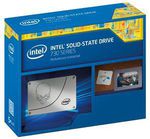Intel 480GB 730 Series MLC SSD $295 (Free Freight)
Stock due in shop Thursday and preorders expected to ship Friday.
Limit 2 per customer. Sale available till stock sold.
The SSD 730 is not just a rebranded enterprise drive, though, as both the controller and NAND interface are running at higher frequencies for increased peak performance…….Given Intel's track record and the best-in-class endurance, the SSD 730 is best for the no-compromise enthusiasts and professionals who really need a reliable and consistent drive. -AnandTech
Read more:
http://hothardware.com/Reviews/Intel-SSD-730-Series-Enthusia…
http://www.guru3d.com/articles-pages/intel-730-ssd-review,1.…
http://www.legitreviews.com/intel-730-series-480gb-ssd-revie…
http://www.storagereview.com/intel_ssd_730_series_review
http://www.anandtech.com/show/7803/intel-ssd-730-480gb-revie…


Bloody cheap. And I just grabbed a new SSD the other day too - a 512gb Crucial MX100. Guessing this Intel was probably a much better buy at only $26 more. Ah well…